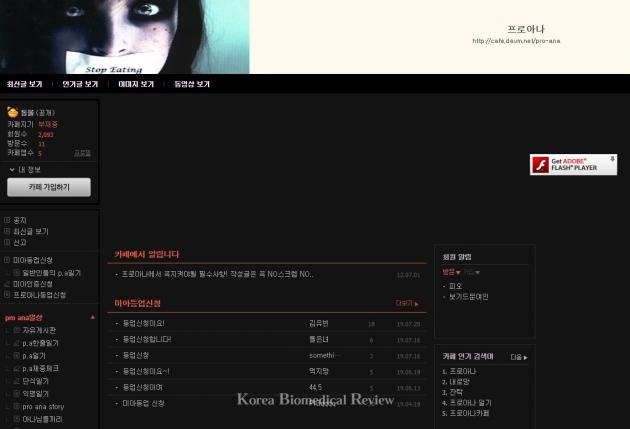The fear of weight gain and the desire to be slim has become a real health concern among Korean adolescents as they are turning toward anorexia -- an eating disorder characterized by food restriction -- to keep thin.
Young people, mostly girls, are promoting the "pro-ana" movement through various websites and social media accounts and sharing detailed information about how to throw away lunch at school without raising alarms and how to not get caught by parents.
Pro-ana refers to the promotion of behaviors related to eating disorder anorexia.
Most teenagers involved in the movement are known not to eat properly and starve themselves until their weight drops to 30-40 kg. Some teenagers even go through extreme measures such as taking vast amounts of constipation pills to reduce weight drastically.
When they do eat a proper meal, they feel guilty and exhibit bulimia symptoms and force themselves to vomit to keep their shape.
Among the teenagers participating in the pro-ana movement, many say that they have become obsessed with having a skinny body due to trauma associated with their shape and body.
"When I was in middle school, I heard a group of men asking me whether I had any conscience for wearing a skirt with my fat leg," a high school student wrote online. "I was 165 cm tall and weighed 90 kg."
Shocked by such harsh words, the student said she lost 20 kg and still eats one meal every three days to stay in shape.
"I'm scared of being criticized for my bodily figure again," she said. "Even my parents, who say they love me no matter what, don't want me to go back to my previous figure."

Medical experts say, however, anorexia can cause many health problems such as malnutrition, osteoporosis, heart disease, hair loss, and depression, and is a fatal mental illness with a reported mortality rate of 15 percent.
It is more harmful to teenagers as their brains and bodies are still developing. If they prolong their dieting through anorexia, it can lead to irregular menstruation, stunted growth, and in extreme cases, death.
Contrary to such concerns, the pro-ana movement has been growing in Korea. According to a report released by the Ministry of Health and Welfare, 23 percent of teenagers who attempted to lose weight in 2017 had chosen to take diarrhea or vomiting after eating.
Another report from the Health Insurance Review & Assessment Service showed that the number of teenagers with eating disorders such as anorexia and bulimia increased to 547 in 2016, 625 in 2017, and 693 in 2018.
Psychotropic appetite suppressants also increased 31.5 percent from 93.2 billion won ($77.4 million) in 2014 to 122.5 billion won in 2018, and non-psychotropic appetite suppressant rose 126.8 percent from 34.9 billion won to 79.1 billion won during the same time.
Pro-anas themselves are not unaware of the risk of anorexia. They know that anorexia is a disease, but believe their actions are justified in a culture that criticizes out of shape people.
"I am sad that the society criticizes the pro-ana movement when everyone wants to be thin," a pro-ana member wrote online. "Please stop complaining that starving can harm my body or that it can lead to yo-yo syndrome. I want to be thin enough so that I can see my bones and I don't care if it damages my health."
With the continued interest in the pro-ana movement among teenagers, doctors and lawmakers alike have raised the need to change social norms and address the issue more aggressively.
"Anorexia is notoriously difficult to combat because it is not only an individual illness but also shaped by social and cultural influences," said Professor Shin Yun-mi at Ajou University Hospital. "The media constantly deliver messages about body ideals and make people want to lose weight."
Eating disorders are mostly found in teenage girls, and they harm both mental and physical health, so they need to be treated as fast as possible as anorexia has a high fatality rate, Shin added.
Rep. Nam In-soon of the ruling Democratic Party of Korea also said, "Eating disorders are caused by a combination of biological, social, and psychological factors. Slimness is a strong criterion for beauty, and social structural issues that emphasize such appearances and discriminates those who do not fit the profile are also important factors."
Nam also addressed the concerns regarding the increase in appetite suppressants.
"The use of appetite suppressants continues to increase due to excessive obsession toward a skinny body," Nam said. "However, it is alarming that psychotropic appetite suppressants, which have serious side effects, account for half of the appetite suppressants prescribed."
Long-term use of psychotropic appetite suppressants increases the risk of side effects such as pulmonary hypertension and severe heart disease, the lawmaker added.
Nam stressed that the government needs to use its integrated drug management system, a monitoring system for drug use history and patient-specific medication history, to take specific measures to prevent abuse of drugs, such as stopping prescription.

